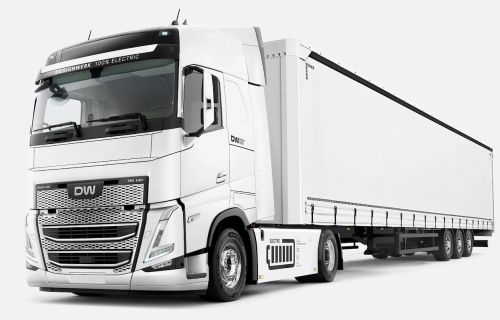
Designwerk’s e-trucks are based on the chassis of the Volvo FM, Volvo FMX and Volvo FH series as well as the low-entry chassis of the Econic from Daimler Trucks AG.
LFP batteries are characterized in particular by a high number of charge cycles and a long service life. The lower overall height of the smaller LFP battery allows it to be used in lowliners, which have up to 15% higher volume capacity or a third level of grid boxes for automotive applications, and are primarily used in distribution transport with a shorter range than long-distance transport.
Companies in long-distance logistics, which rely on the highest energy densities due to the required range, continue to benefit from the high-voltage battery systems with nickel-manganese-cobalt (NMC) cell technology from Designwerk.
The high-voltage LFP battery systems have an energy density of 141 Wh/kg with a relatively small construction volume and a capacity of 170 kWh. Another strength of the LFP cell is its higher cycle stability.
With LFP cells, we expect the end of life to be reached after at least 3000 cycles; with NMC cells, it is reached after approximately 2000 cycles. So with LFP, the maximum mileage for the vehicle is significantly higher.
—Thomas Prohaska, Product Manager Battery Systems at Designwerk
If range and low weight are required, the high-voltage battery systems with existing NMC cell technology are used in the Designwerk trucks. The latest generation of Designwerk has a capacity of up to 250 kWh and an energy density of 181 Wh/kg. Capacities of up to 1000 kilowatt hours are possible in a single unit or connected together in battery sets with several megawatt hours.
One range champion, for example, is the MID CAB Car Carrier 6x2R car transporter developed jointly with Kässbohrer. With a charging power of 350 kW, the battery can be charged to 80 percent capacity in under two hours.
Designwerk manufactures both high-voltage battery systems at its Swiss plant in Winterthur. The respective modules from the automotive industry consist of several cells that store and release the energy. The overall system consists of a housing with thermal insulation to protect the battery modules from the outside world. Cooling plates are used to keep the modules within their ideal temperature range. Protective functions are ensured due to the battery management system (BMS), which is tailored to the chemistry and permanently monitors the overall system and communicates with the higher-level system.
After use in a vehicle, the battery is tested for further use, for example in a stationary application as industrial storage or as buffer storage in a charging station (Mega Charger). Only at the final end of its life is the battery handed over for disposal, with the battery’s valuable raw materials being recycled in accordance with the current state of the art.